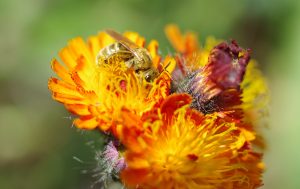The “Gartenfülle” Citizen Science Project aims to record flowering plants in Braunschweig’s home and allotment gardens in 2024.

Bee conservationists from the JKI ask citizens to participate in the identification project by photographing plants using an additional feature of the Flora-Incognita app. Collected data helps to specifically promote wild bees.
(Braunschweig) Garden enthusiasts in Braunschweig are invited to participate as citizen scientists in the project “Gartenfülle – unexpected diversity in allotment gardens”. The researchers of the Julius Kühn Institute (JKI), together with many municipal partner institutions, aim to record the plant diversity in Braunschweig’s gardens throughout the year. For this, they rely on the help of the public.
Allotment and home gardens are characterized by a high diversity of ornamental, useful, and wild plants, as well as small structures, and are therefore potential hotspots for wild bees. Since many wild bee species depend on very specific plants as a pollen source, they require a diverse supply of flowering plants for survival. To assess the potential of regional garden areas for wild bee conservation, the most accurate possible knowledge of the occurring plant species is essential. This is where the “Gartenfülle” project comes in. This
participatory project complements the “BeesUp” project, coordinated by the JKI’s Institute for Bee Protection. The project, ongoing since 2021, investigates the wild bee-friendly design and maintenance of differently used open spaces in urban areas. In recent years, many flowering areas have already been created together with the Department of Urban Greenery and Sports. Within the framework of the Gartenfülle project, information on wild bee-friendly plants will now be increasingly provided at events such as plant markets.
Further information can be found here.
